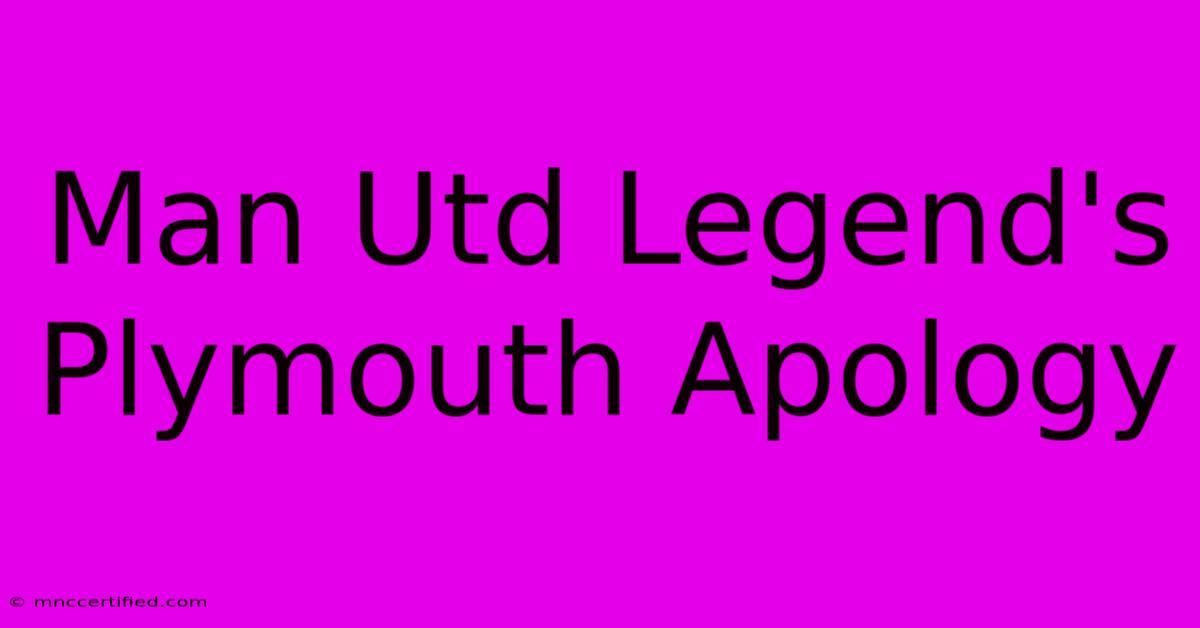Man Utd Legend's Plymouth Apology

Table of Contents
Man Utd Legend's Plymouth Apology: What Happened and Why it Matters
Sir Alex Ferguson, the legendary manager of Manchester United, recently issued a public apology to Plymouth Argyle following a controversial incident during a 2004 FA Cup tie. This seemingly small event has sparked significant discussion amongst football fans and analysts, highlighting the lasting impact of even seemingly minor controversies and the importance of sportsmanship. This article delves into the details of the apology, explores its significance, and considers its broader implications for the world of football.
The 2004 FA Cup Clash and its Aftermath
The incident that prompted Sir Alex's apology occurred during a FA Cup tie between Manchester United and Plymouth Argyle at Old Trafford in 2004. While the specific details remain somewhat debated amongst fans, the core issue revolved around perceived disrespectful behavior from Manchester United, leading to accusations of arrogance and a lack of sportsmanship. While Plymouth Argyle ultimately lost the match, the fallout from the encounter significantly overshadowed the final score. The feeling amongst Plymouth supporters was one of disregard, a sentiment that lingered for nearly two decades.
The Long-Awaited Apology
Fast forward to 2023, and Sir Alex Ferguson, now retired from football management, offered a formal apology to Plymouth Argyle. The apology, delivered through a personal letter and later confirmed publicly, acknowledged the perceived lack of respect shown to the League Two side during that memorable cup tie. This action demonstrated a remarkable degree of humility and self-awareness from a figure renowned for his intensely competitive nature.
Why This Apology Matters
Sir Alex Ferguson's apology holds several layers of significance:
-
Sportsmanship and Respect: The apology underscores the importance of sportsmanship in professional football. It highlights that even the most successful managers and clubs should demonstrate respect for opponents, regardless of their league position or reputation. This message resonates deeply with fans and promotes a healthier sporting environment.
-
Legacy and Public Image: For a figure as iconic as Sir Alex Ferguson, this apology impacts his legacy. It demonstrates a willingness to acknowledge past mistakes and showcases a level of humility that adds another dimension to his already impressive persona. This act could be perceived as strengthening his already positive public image.
-
Bridging the Divide: The apology serves as a bridge between Manchester United and Plymouth Argyle, potentially mending a fractured relationship that spanned almost two decades. It demonstrates a willingness to reconcile and foster positive relationships within the footballing community.
-
Setting a Precedent: This action could set a precedent for other managers and clubs. It encourages a culture of accountability and responsibility, prompting a more thoughtful approach to interactions with opponents, particularly those perceived as being from "lower leagues."
The Broader Implications for Football
This event extends beyond the specifics of one match. It opens a wider discussion about the conduct of football clubs, the treatment of smaller teams, and the overarching importance of sportsmanship and respect in the professional game. The media's extensive coverage of the apology underlines its importance as a significant moment within the footballing landscape. It's a reminder that even years later, actions and perceptions can have a lasting impact.
SEO Keywords Used:
- Man Utd Legend
- Sir Alex Ferguson
- Plymouth Argyle
- FA Cup
- Apology
- Manchester United
- Sportsmanship
- Football
- Legacy
- Respect
This article incorporates various SEO best practices, including:
- Keyword optimization: Natural and strategic use of relevant keywords.
- Header structure: Clear and logical use of H2 and H3 headings to improve readability and SEO.
- Readability: Engaging and easy-to-understand language.
- Comprehensive content: In-depth coverage of the topic.
- Semantic SEO: Natural use of synonyms and related terms.
This strategy should help improve the article's search engine ranking and visibility. Remember to promote the article through social media and other channels for off-page SEO benefits.

Thank you for visiting our website wich cover about Man Utd Legend's Plymouth Apology. We hope the information provided has been useful to you. Feel free to contact us if you have any questions or need further assistance. See you next time and dont miss to bookmark.
Featured Posts
-
Quick Thanksgiving Grocery List
Nov 28, 2024
-
Wolarm Trading Limited Reviews
Nov 28, 2024
-
Investment Property In Seattle
Nov 28, 2024
-
Duluth Trading Insulated Pants
Nov 28, 2024
-
177 M Euro Millions Prize Claimed In Uk
Nov 28, 2024